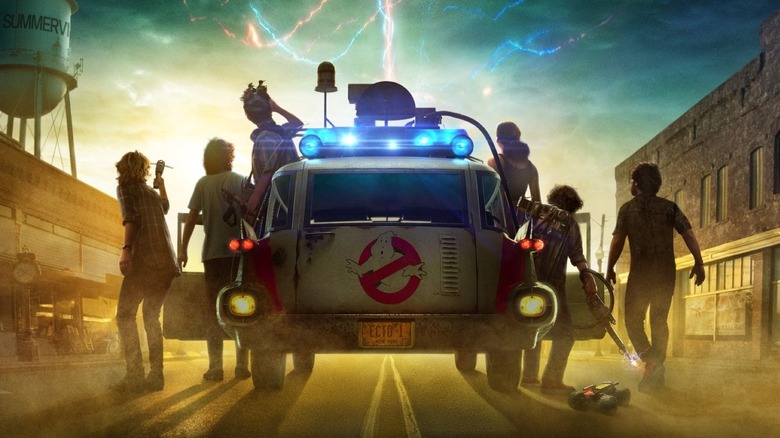
This weekend brought with it the release of "Ghostbusters: Afterlife," which is, in some ways, something a great many moviegoers have been waiting 30 years or so to see. As opposed to the 2016 reboot, this served as more of a proper "Ghostbusters 3," and it proved to be a winning formula, as director Jason Reitman's legacy sequel easily topped the box office. In doing so, it may have provided a path forward for blockbuster filmmaking in the post-pandemic era.
Ghostbusters: Afterlife Wins In More Ways Than One

According to Box Office Mojo, "Ghostbusters: Afterlife" took in $44 million in its opening weekend domestically, on its way to a $60 million global debut. The especially good thing here is that it still has many international markets to open in. The bad news is that the pandemic is far from done with us earthlings, as Europe is facing another wave and some countries are even entering lockdown. While it is far from the primary concern, that does have a big effect on the box office. There are no guarantees anymore, and there probably won't be for a while.
Therein lies the true lesson provided by this movie. It wasn't produced with a pandemic in mind, but after suffering a huge flop with 2016's "Ghostbusters" ($144 million budget/$229 million box office), Sony decided not to repeat the mistakes of the recent past. Instead, Reitman managed to craft this latest entry for a relatively lean $75 million. Much has been made of the fact that "Afterlife" made less on its opening weekend than the reboot ($46 million). However, the reboot was released in July, typically a more robust moviegoing month than November. It also, among many other things, didn't have a pandemic to contend with. That $2 million is negligible taking that all into account.
Even setting that aside, if "Afterlife" makes exactly what the reboot made and finishes its run with $229 million, it can still be possible, whereas that would be disastrous for a massive-budget blockbuster. Look what happened with "The Suicide Squad," for example ($185 million budget/$167 million global box office). The point is, as Hollywood faces an uncertain future, the $200 million blockbusters cannot be the future, and it probably shouldn't have ever become the norm in the first place. Say what you will about "Afterlife," but its audience score is far higher on Rotten Tomatoes than the previous movie, and it manages to pack in the blockbuster thrills without breaking the bank. To quote "The Mandalorian," this is the way.
Bond Races Past Fast & Furious

It was a relatively quiet week outside of bustin' making audiences feel good. However, "No Time to Die," the fifth and final entry in Daniel Craig's tenure as James Bond, has now earned $734 million worldwide. That puts it past "F9" ($721 million), making it the highest-grossing American movie of the pandemic era. It is also the lowest-grossing movie domestically to ever cross $700 million at the box office overall. Still, this proves that a mega-hit blockbuster is still possible, though only under extremely specific circumstances.
Still, circling back to our previous point, the film came with a massive reported $250 million production budget, and that doesn't account for marketing. Previous estimates stated that it needed to make somewhere in the neighborhood of $800 million just to break even. This simply cannot happen in the future if we want blockbuster filmmaking as an art form (one that is inherently reliant on global commerce) to continue.
And The Rest...

Marvel's "Eternals" came in at the number two spot this weekend, taking in another $10.8 million in its third weekend. It now stands at $336 million worldwide after crossing the $300 million mark before heading into the weekend. Even though it's weighted heavily internationally, and has earned mixed reviews, it looks like Marvel will have another $400 million box office hit on its hands without any help from China. That seems increasingly to be the newly-lowered bar for many of these blockbusters in the new era, which simply isn't enough to justify $200 million budgets. But it's plenty to allow big movies such as this to exist.
"Clifford the Big Red Dog" dropped 51% in its second frame, taking in another $8.1 million after nearly giving "Eternals" a run for its money last week. To date, the family-friendly flick has made $33 million domestically, while also being available to rent on premium VOD. This, more and more, seems like the path from family flicks in the future, and one of the rare situations where a hybrid release for a relatively expensive movie might actually make sense.
The weekend's other new release was Oscar hopeful "King Richard," which stars Will Smith as the father of tennis greats Venus and Serena Williams. Despite earning widely positive reviews, it made just $5.7 million, falling to the number four spot in its opening frame. However, it is also available on HBO Max and, given that a sports drama about tennis doesn't necessarily demand to be seen on the big screen, it seems likely that might be cutting into its take. Though it's impossible to say just how much.
Looking ahead to this week, we've got Disney's "Encanto," Ridley Scott's "House of Gucci," and "Resident Evil: Welcome to Raccoon City" all opening mid-week to get in on the Thanksgiving action.
Read this next: 13 Box Office Bombs That Are Truly Worth A Watch
The post Ghostbusters: Afterlife Box Office Offers a Path for Hollywood's Post-Pandemic Future appeared first on /Film.
0 Comments